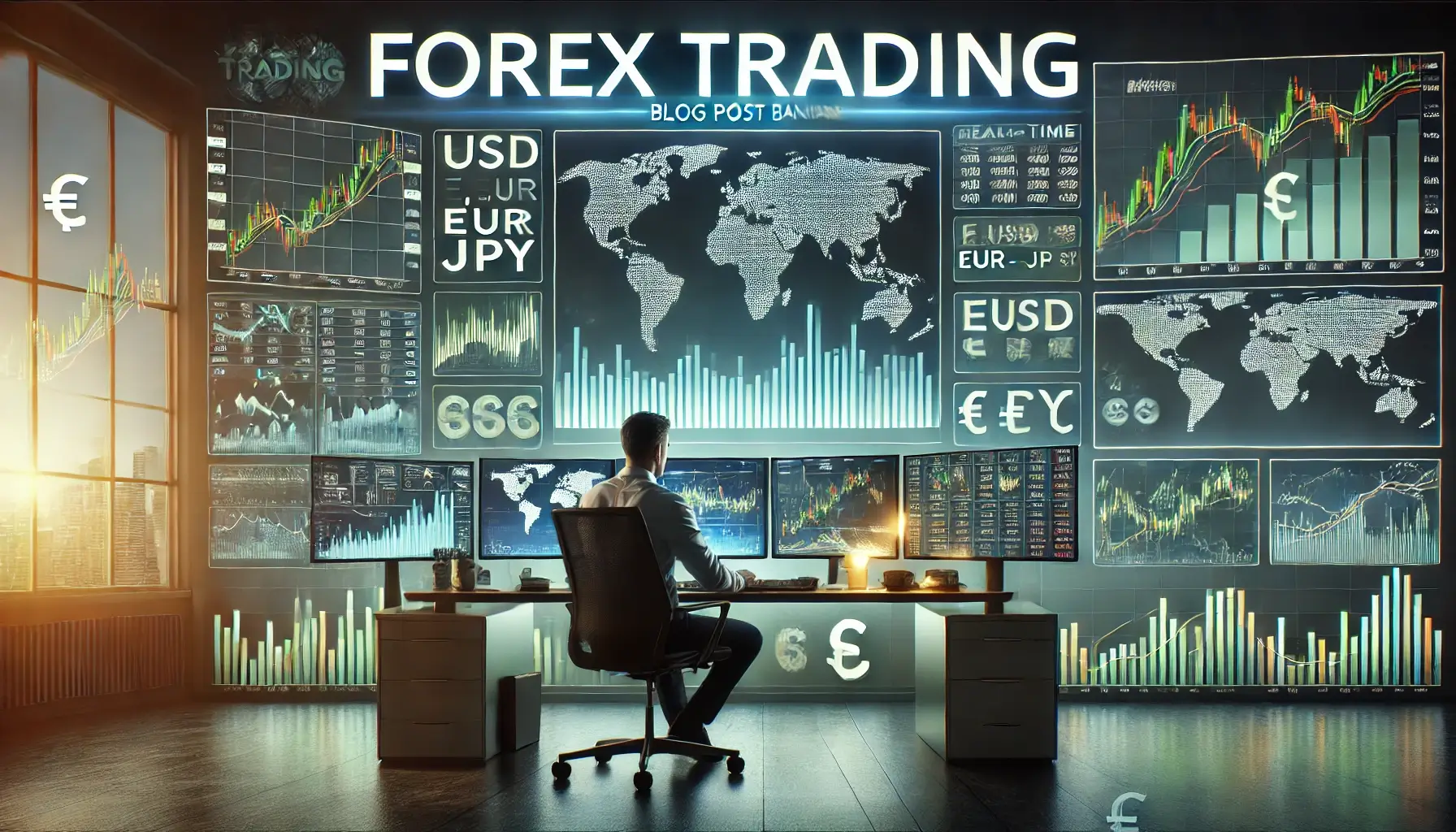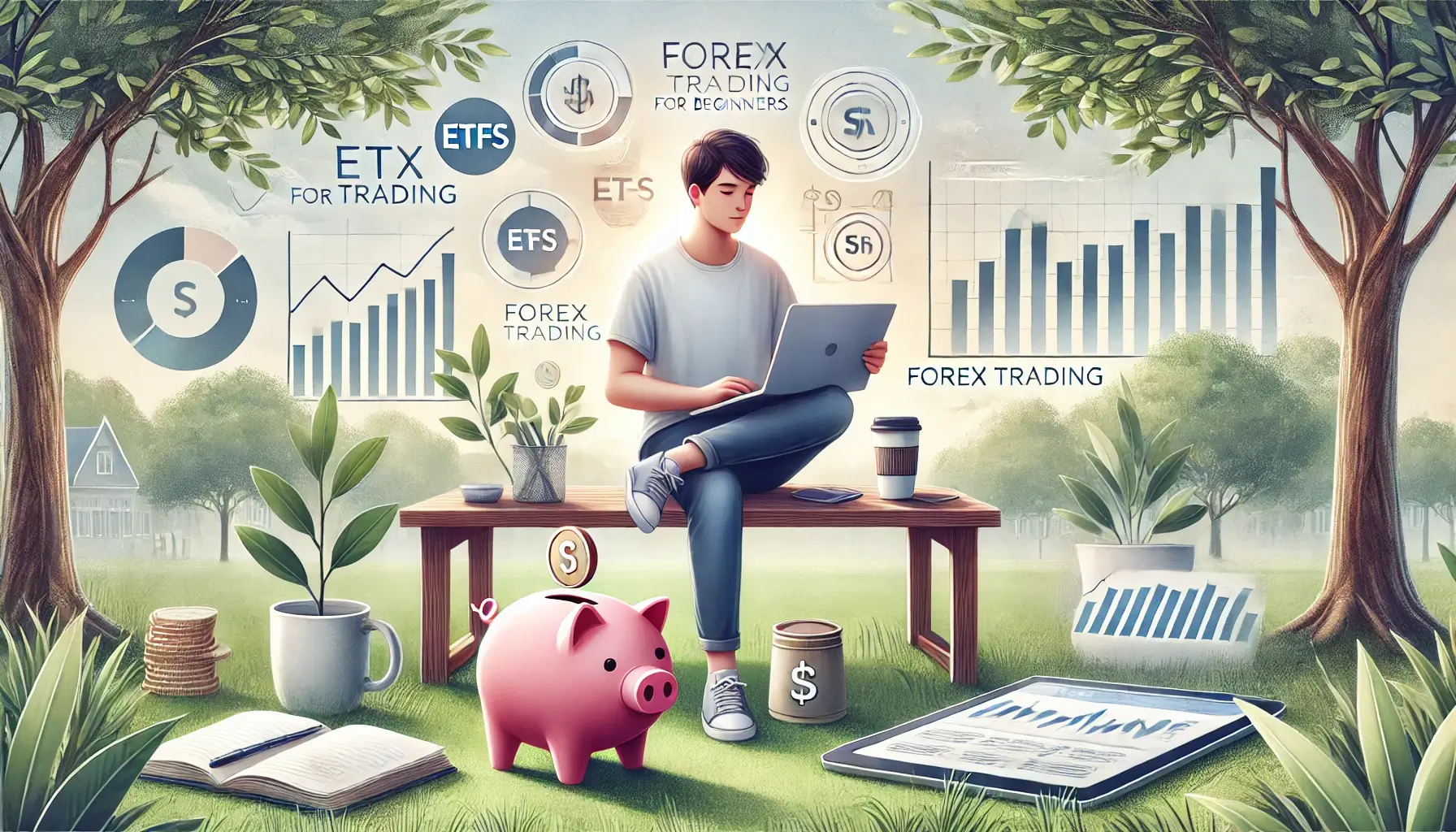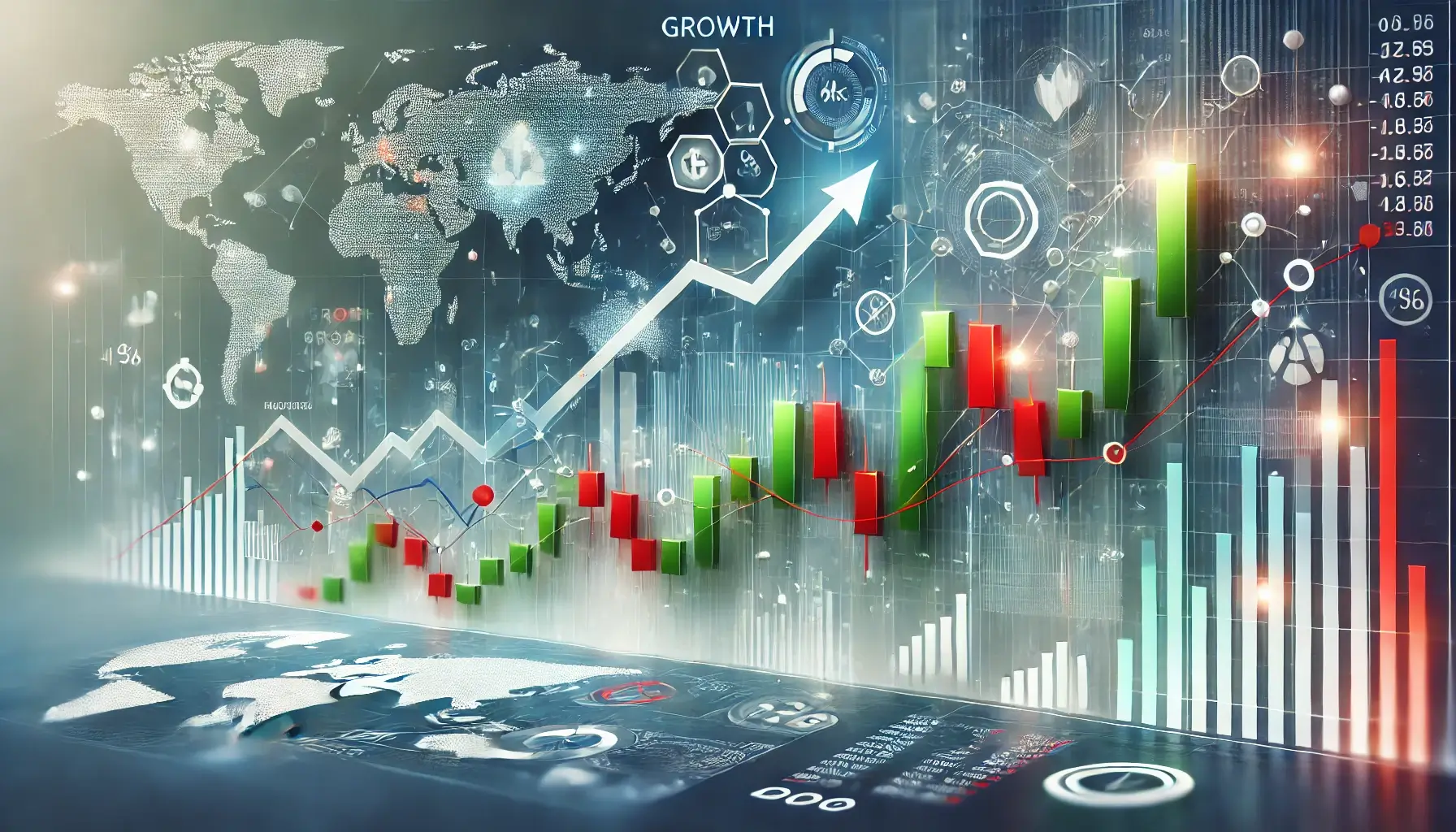Forex trading, also known as foreign exchange trading, is the practice of buying and selling currencies in the world’s largest financial market. With a daily trading volume surpassing $7 trillion, the forex market stands as the largest and most liquid financial market, significantly outpacing stocks and commodities in both scale and liquidity. Whether you’re a seasoned investor or exploring forex trading for beginners, this market offers endless opportunities to profit from fluctuating exchange rates.
The importance of the forex market extends beyond individual traders—it plays a critical role in the global economy by facilitating international trade, investment, and tourism. For those intrigued by its potential, forex trading can be both a lucrative and exciting venture. This guide will walk you through everything you need to know, from understanding the fundamentals to exploring tools like MetaTrader 4 and MetaTrader 5, and choosing the best forex broker to start your journey.
What is Forex Trading?
Definition of Forex Trading
Forex trading entails buying one currency while simultaneously selling another, aiming to profit from fluctuations in exchange rates. The process happens in currency pairs, such as EUR/USD (Euro/US Dollar) or GBP/JPY (British Pound/Japanese Yen). Unlike traditional stock markets, the forex market operates 24 hours a day, five days a week, making it highly accessible for traders across different time zones.
How the Forex Market Operates
At its core, the forex market functions as a decentralized marketplace where participants trade currencies electronically through a network of banks, brokers, and trading platforms. Here’s a breakdown of how it works:
- Currency Pairs: Forex trading always involves two currencies—a base currency and a quote currency. For instance, in the EUR/USD currency pair, the Euro acts as the base currency, whereas the USD serves as the quote currency.
- Exchange Rates: The exchange rate reflects how much of the quote currency you need to buy one unit of the base currency. Changes in these rates drive profits or losses for traders.
- Bid and Ask Prices: The bid price represents the maximum amount a buyer is ready to pay, while the ask price indicates the minimum amount a seller is willing to accept. The difference between these is known as the spread.
Key Players in the Forex Market
The forex market’s vast size and decentralized nature attract a diverse range of participants, including:
- Central Banks: These institutions influence currency prices through monetary policy and interventions.
- Retail Traders: Individual investors who trade through platforms like MetaTrader 4 or MetaTrader 5, often with brokers’ assistance.
- Hedge Funds: Large financial firms that use forex to hedge risk or generate profit through speculation.
- Corporations: Businesses engaging in forex trading to manage currency exposure from international operations.
The Size and Scope of the Forex Exchange Market
The forex market’s unparalleled size and liquidity make it the dominant force in the global financial landscape. Daily transactions in this market exceed $7 trillion, providing unparalleled opportunities for those seeking to diversify their investments. The vast number of trading platforms, including some of the best forex trading platforms, ensures traders have access to advanced tools and resources.
Key Insights for Beginners
For beginners, the forex market may seem intimidating, but it’s accessible with the right tools and knowledge. Platforms like MetaTrader 4 (MT4) and MetaTrader 5 (MT5) are designed to provide user-friendly interfaces and analytical tools, making them ideal choices for those starting out. Pair these platforms with guidance from a reliable forex broker, and you’ll have everything you need to take your first steps into the forex market.
Additionally, funded programs like My Forex Funds offer an innovative way to enter the market by providing capital for qualified traders. Whether you’re a novice or a seasoned professional, understanding these resources can significantly boost your chances of success.
Why Is Forex Trading Popular?
The Unique Advantages of Forex Trading
Forex trading has grown to become one of the most popular financial activities worldwide, attracting everyone from seasoned investors to newcomers. Its appeal lies in its flexibility, accessibility, and opportunities for substantial returns. Here are the key reasons why forex trading is a preferred choice for many:
1. 24/5 Trading Availability
Unlike stock markets, which are typically limited to specific trading hours, the forex market operates 24 hours a day, five days a week. This schedule accommodates traders across various time zones, allowing them to trade currencies at their convenience. Whether you’re an early riser or a night owl, there’s always an opportunity to participate.
2. High Liquidity
The forex market is the most liquid financial market in the world, with daily trading volumes exceeding $7 trillion. This high liquidity ensures that trades can be executed quickly and at tight spreads, making it easier for traders to enter and exit positions without significant price slippage.
3. Leverage Opportunities
Forex brokers frequently provide leverage, enabling traders to manage larger positions with a comparatively small capital outlay. For instance, a leverage ratio of 100:1 means you can control $10,000 in currency with just $100. While leverage amplifies potential profits, it also increases risks, making it essential for traders to use it wisely.
4. Low Barriers to Entry
Getting started in forex trading is easier than in many other financial markets. With platforms like MetaTrader 4 (MT4) and MetaTrader 5 (MT5) offering demo accounts, beginners can practice trading without risking real money. Additionally, programs like My Forex Funds provide capital to qualified traders, further lowering the barriers to entry.
Forex Trading vs. Other Financial Markets
Forex vs. Stocks
- Market Hours: Unlike stock markets, forex operates continuously during weekdays.
- Liquidity: Forex offers higher liquidity, reducing the risk of holding illiquid positions.
- Volatility: Forex is often more volatile, presenting both opportunities and risks for traders.
Forex vs. Commodities
- Diversity: While commodities focus on goods like gold or oil, forex involves currency pairs from all over the world.
- Accessibility: Compared to commodities trading, forex typically requires a lower initial investment, making it more accessible to a wider range of traders.
For those seeking flexibility and high liquidity, forex trading stands out as a top choice among financial markets.
The Allure of Forex Trading for Beginners
Forex trading appeals to beginners because of its accessibility, educational resources, and tools like MetaTrader 4 and MetaTrader 5, which simplify the trading process. Many brokers also offer step-by-step guidance and support, helping new traders navigate the complexities of the market. With the right strategy and tools, even those with no prior experience can succeed in forex trading.
Essential Forex Trading Concepts
To trade effectively, understanding the fundamentals of forex trading is crucial. Below are the essential concepts every trader should know:
1. Currency Pairs
Currencies are traded in pairs, and each pair falls into one of three categories:
- Major Pairs: Include the most traded currencies, such as EUR/USD and USD/JPY.
- Minor Pairs: Exclude the US dollar but feature major global currencies like EUR/GBP.
- Exotic Pairs: Consist of currencies from developing economies, like USD/TRY (US Dollar/Turkish Lira).
Each type of pair offers unique opportunities and risks, making it essential for traders to choose pairs that align with their strategies.
2. Bid-Ask Spread and Pips
- Bid-Ask Spread: Refers to the gap between the price at which buyers are willing to purchase (bid) and sellers are willing to sell (ask). Tighter spreads are more favorable for traders as they reduce transaction costs.
- Pips: A pip is the smallest price movement in a currency pair, typically 0.0001 for most major pairs. Understanding pips is fundamental to calculating profits and losses in forex trading.
3. Leverage and Margin in Forex Trading
Leverage allows traders to control large positions with minimal capital, while margin is the collateral required to open and maintain a leveraged position. For instance:
- If a trader uses 50:1 leverage, a $1,000 margin can control a $50,000 position.
- While leverage amplifies gains, it also increases the risk of significant losses, making risk management essential.
4. Fundamental vs. Technical Analysis
- Fundamental Analysis: Emphasizes studying economic data, central bank decisions, and global geopolitical events to forecast currency trends.
- Technical Analysis: Uses charts, patterns, and indicators to forecast price trends. Platforms like MetaTrader 4 and MetaTrader 5 are invaluable tools for performing technical analysis.
Both approaches are crucial, and many traders combine them for a comprehensive strategy.
5. Introduction to Forex Trading Platforms
Forex trading platforms are the gateway to the market. ell-known platforms such as MetaTrader 4 and MetaTrader 5 provide a range of essential features for traders.
- Advanced charting tools and customizable indicators.
- Automated trading through expert advisors (EAs).
- Compatibility with mobile and desktop devices for trading on the go.
Choosing the best forex trading platform and a reliable forex broker is vital for ensuring a smooth trading experience.
Getting Started with Forex Trading for Beginners
The Importance of Education and Research
Forex trading for beginners can seem complex, but success starts with a solid foundation of knowledge. Understanding market trends, technical analysis, and risk management is crucial. Beginners should invest time in:
- Reading articles and guides on forex trading.
- Taking advantage of free educational resources offered by many brokers.
- Watching webinars and tutorials on platforms like MetaTrader 4 and MetaTrader 5.
Remember, informed traders make better decisions and are less likely to fall prey to market volatility.
Setting Up a Forex Trading Account
Choosing a Reliable Forex Broker
Your choice of a forex broker significantly impacts your trading experience. Look for brokers that are:
- Regulated and trustworthy: Ensure the broker is licensed by authorities like the FCA, ASIC, or CySEC.
- Transparent with fees: Opt for brokers offering competitive spreads and low transaction costs.
- Well-reviewed: Check user reviews to confirm the broker’s reputation for reliability and support.
Some of the best forex brokers also provide access to advanced trading tools and resources like My Forex Funds, which can support your trading capital.
Steps to Open a Forex Trading Account
- Choose Your Broker: Select a broker that meets your needs and trading goals.
- Register Online: Provide personal details and verify your identity with government-issued documentation.
- Fund Your Account: Deposit funds using available payment methods like bank transfers, credit cards, or e-wallets.
- Access the Trading Platform: Once your account is active, download the broker’s platform (e.g., MetaTrader 4 or MetaTrader 5) and start exploring.
Selecting the Best Forex Trading Platform
A good trading platform is the backbone of a seamless trading experience. Popular choices include:
- MetaTrader 4 (MT4):
Ideal for beginners, MT4 offers user-friendly tools for technical analysis and automated trading. - MetaTrader 5 (MT5):
A more advanced platform with additional features like multi-asset support and improved charting tools. - Alternatives: Some brokers offer proprietary platforms tailored to their clients’ needs. Evaluate and compare the features of different options before finalizing your choice.
Practicing with a Demo Account
Gain hands-on experience by practicing with a demo account before committing real funds. This feature, available on platforms like MT4 and MT5, allows you to:
- Familiarize yourself with the trading interface.
- Test strategies in a risk-free environment.
- Gain confidence before transitioning to live trading.
A demo account bridges the gap between theoretical knowledge and real-world application, making it an essential step for beginners.
Choosing the Best Forex Broker and Platform
Characteristics of the Best Forex Broker
When evaluating brokers, prioritize the following:
- Regulation and Safety: Ensure the broker operates under strict regulatory frameworks to protect your investments.
- Competitive Spreads and Fees: Look for brokers with tight spreads and no hidden fees.
- User-Friendly Platforms: Choose brokers offering intuitive platforms like MetaTrader 4 and MetaTrader 5 to enhance your trading experience.
Top Forex Brokers for 2025
Here are some of the best forex brokers known for their exceptional service:
- Broker A: Offers competitive spreads and supports both MT4 and MT5.
- Broker B: Known for fast execution and robust customer support.
- Broker C: Provides additional educational resources and tools for beginners.
Comparison of MetaTrader 4 (MT4) vs. MetaTrader 5 (MT5)
While both platforms are widely used, they cater to different trading needs:
| Feature | MetaTrader 4 | MetaTrader 5 |
| Target Audience | Beginners and forex traders | Advanced traders and multi-asset traders |
| Charting Tools | Basic but effective | Enhanced with more indicators |
| Order Types | Standard | More advanced options |
| Asset Classes | Focused on forex trading | Supports forex and additional assets |
Which Platform is Best for You?
- Choose MT4 if you’re new to forex trading and want a straightforward interface.
- Opt for MT5 if you’re an experienced trader looking for more features and asset variety.
Forex trading offers tremendous potential for financial growth, but success depends on preparation and informed choices. By selecting a reliable forex broker, practicing on a demo account, and using the best forex trading platform, you can confidently navigate the forex exchange market. Whether you’re starting with MT4 or exploring advanced tools on MT5, the right decisions will pave the way for a rewarding trading experience.
Advanced Forex Trading Strategies
Forex trading, one of the most dynamic financial markets, requires more than just basic knowledge to succeed. By mastering advanced strategies, traders can maximize their chances of success in the ever-volatile forex exchange market. Below, we explore the most effective forex trading strategies and their implementation, along with the critical aspects of risk management and trader psychology.
Explanation of Forex Trading Strategies
Forex trading strategies vary in complexity and time commitment, making it essential for traders to choose one that aligns with their goals and resources. Here are four popular strategies:
- Scalping
- Scalping involves executing numerous trades within a single day to capitalize on minor price movements.
- Traders often use the best forex trading platforms like MetaTrader 4 or MetaTrader 5 for real-time analytics and fast execution.
- Example: A scalper might trade EUR/USD multiple times within an hour, aiming to earn a few pips per trade.
- Day Trading
- Day traders enter and exit trades within the same trading session to minimize exposure to overnight market fluctuations.
- This strategy requires constant monitoring and works well with tools like economic calendars to anticipate market movements.
- Example: Using a forex trading platform, a trader might buy GBP/USD in the morning based on news events and close the position by the afternoon.
- Swing Trading
- Swing traders maintain positions over several days or weeks, aiming to capitalize on medium-term price movements..
- Swing trading relies heavily on technical analysis, using charts and indicators available on platforms like MetaTrader 4.
- Example: A trader might buy USD/JPY based on a bullish chart pattern and hold the position until it reaches a defined resistance level.
- Position Trading
- Position trading focuses on long-term market trends and requires significant patience.
- Traders use fundamental analysis, including interest rate changes and economic indicators, to inform their decisions.
- Example: An investor might hold EUR/CHF for several months, anticipating a policy change from a central bank.
Importance of Risk Management
Effective risk management is crucial in forex trading to protect against significant losses. Here are the key components:
- Stop-Loss Orders: Automatically close a trade if the market moves against you by a predetermined amount.
- Take-Profit Orders: Lock in profits by closing a trade when it reaches a target price.
- Position Sizing: Determine trade sizes based on your account equity and personal risk appetite. A widely followed guideline is to limit risk to 1-2% of your total capital per trade.
The Role of Psychology in Forex Trading Success
Trading psychology often determines success in forex trading. Emotional control, discipline, and maintaining a positive mindset are essential. Overcoming fear and greed while sticking to a trading plan can help traders avoid impulsive decisions. Regular practice on demo accounts, like those provided by My Forex Funds, can enhance psychological resilience.
Tools and Resources for Successful Forex Trading
The right tools and resources can elevate your trading experience, making it easier to analyze markets and execute strategies.
Essential Tools for Traders
- Charts and Indicators: Tools like candlestick charts, moving averages, and RSI are indispensable for technical analysis.
- Economic Calendars: Stay informed about major economic events that can impact the forex exchange market.
Trading Platforms
- MetaTrader 4 (MT4) and MetaTrader 5 (MT5): These are among the best forex trading platforms, offering comprehensive features for charting, backtesting, and automated trading.
- Forex Brokers: Choosing the best forex broker is critical for accessing reliable trading platforms, competitive spreads, and proprietary tools.
Leveraging Educational Resources
- Courses: Online courses designed for forex trading for beginners help build a strong foundation.
- Forums and Blogs: Engage with experienced traders and access actionable insights.
- Broker Resources: Many brokers, like those offering My Forex Funds, provide proprietary tools and educational content to aid traders.
Proprietary Tools Offered by Brokers
Top brokers often provide unique tools to enhance the trading experience. For example, My Forex Funds offers funding programs, helping traders manage larger accounts without risking personal capital. Such tools can be game-changers for both new and experienced traders.
Common Pitfalls in Forex Trading
Forex trading can be a rewarding venture, but it is not without its challenges. Many novice traders often encounter preventable mistakes that slow down their progress. Understanding these pitfalls and how to overcome them is essential for long-term success.
Common Mistakes by Beginners
- Over-Leveraging
- Leverage enables traders to manage larger trade positions with a relatively small investment. While it magnifies potential profits, it also increases risks.
- Many beginners misuse leverage, leading to significant losses.
- Tip: Start with low leverage and gradually increase as you gain experience. Platforms like MetaTrader 4 and MetaTrader 5 provide tools to manage leverage effectively.
- Emotional Trading
- Emotional factors like fear and greed frequently drive traders to make hasty and irrational decisions.
- For example, a trader may hold onto a losing position too long, hoping for a reversal, or exit a profitable trade prematurely out of fear.
- Tip: Stick to your trading plan and use stop-loss orders to minimize emotional influence.
- Lack of a Trading Plan
- Many beginners dive into trading without a clear strategy or goals, resulting in inconsistent performance.
- Tip: Develop a detailed plan outlining your trading goals, strategies, risk management rules, and evaluation criteria.
How to Avoid Scams in Forex Trading
The forex market attracts not only legitimate traders but also scammers. To protect yourself:
- Research the Broker: Always trade with a regulated forex broker. Regulated brokers ensure compliance with financial laws and provide transparency.
- Verify Credentials: Check if the broker is registered with recognized financial authorities.
- Avoid Unrealistic Promises: Be cautious of schemes promising guaranteed high returns with little risk.
- Use Trusted Platforms: Stick to well-known forex trading platforms like MetaTrader 4 and MetaTrader 5.
Importance of Choosing Regulated Brokers and Platforms
A regulated broker ensures your funds are protected, and you have access to fair trading practices. Look for brokers that offer:
- Competitive spreads.
- Reliable trading platforms.
- Educational resources tailored for forex trading for beginners.
Platforms like MetaTrader 4 and MetaTrader 5 are considered some of the best forex trading platforms due to their robust analytics and user-friendly interfaces.
Forex Trading and the Global Economy
Forex trading is deeply intertwined with global economic dynamics. Exchange rate movements impact trade, investment, and economic stability.
How Forex Exchange Rates Impact Global Trade and Economies
- A strong currency makes a country’s exports more expensive, reducing competitiveness in global markets.
- Conversely, a weak currency can boost exports but may lead to inflation as import costs rise.
- For traders, these dynamics offer opportunities to profit by predicting currency movements based on economic trends.
The Influence of Geopolitical Events and Central Bank Policies
- Geopolitical Events: Wars, trade agreements, and political instability can cause significant market volatility.
- Central Bank Policies: Interest rate changes, quantitative easing, and monetary policy announcements directly impact currency values.
- Example: A trader using a forex trading platform might buy USD when the Federal Reserve signals an interest rate hike.
Opportunities During Volatile Market Conditions
Volatility creates both risks and opportunities for traders. With the right strategies and tools, such as those available on MetaTrader 5, traders can capitalize on price swings while managing risks.
My Forex Funds: A Unique Opportunity
Overview of My Forex Funds and Its Role in Forex Trading
My Forex Funds is a proprietary trading firm that provides funding and resources to aspiring traders. By offering access to larger trading accounts, it helps traders grow without risking their own capital excessively.
How Proprietary Trading Firms Support Traders
- Funding: Traders can access significant capital once they prove their trading skills.
- Training: Many firms provide educational resources tailored for forex trading for beginners and advanced traders.
- Risk Management: Proprietary firms often set strict risk parameters to protect both the trader and the firm’s capital.
Benefits of Working with Programs Like My Forex Funds
- No Personal Capital Risk: Traders only risk losing their share of the profits rather than their initial capital.
- Access to Advanced Tools: Programs often include access to the best forex trading platforms, such as MetaTrader 4.
- Continuous Support: Firms like My Forex Funds offer mentorship, analytics, and community support to enhance trader performance.
Future Trends in Forex Trading
The forex trading landscape is constantly evolving, driven by technological advancements and market dynamics. Understanding these trends can help traders stay ahead of the curve and capitalize on emerging opportunities.
Impact of Technology on the Forex Market
- AI and Machine Learning in Trading Strategies
- Artificial intelligence (AI) and machine learning are transforming the way traders analyze data and execute trades.
- Algorithms can process vast amounts of market data to identify patterns and predict price movements, offering a competitive edge.
- Example: Some of the best forex trading platforms now integrate AI tools for automated trading and enhanced analytics.
- Evolution of Forex Trading Platforms
- Platforms like MetaTrader 4 and MetaTrader 5 continue to lead the market, offering advanced charting tools, technical indicators, and automated trading features.
- The rise of mobile trading apps ensures traders can access the forex exchange market anytime, anywhere.
- Rising Popularity of Cryptocurrency in Forex Trading Pairs
- Digital assets such as Bitcoin and Ethereum are becoming increasingly popular for trading alongside traditional forex pairs.
- Their volatility provides high-risk, high-reward opportunities, attracting both seasoned traders and forex trading for beginners.
- Many brokers now offer crypto pairs, integrating them seamlessly into their forex trading platforms.
Predictions for the Forex Market in the Next Decade
- Increased Regulation: As forex trading grows, governments worldwide are expected to introduce stricter regulations, benefiting traders by reducing fraud and ensuring transparency.
- Decentralized Finance (DeFi): DeFi technologies may lead to new trading models, bypassing traditional forex brokers.
- AI-Driven Markets: Advanced AI systems could lead to highly efficient and automated forex markets.
FAQs About Forex Trading
What Is Forex Trading and How Does It Work?
Forex trading involves buying and selling currency pairs on the forex exchange market to profit from price fluctuations. It operates 24/5, allowing traders to engage in real-time global transactions.
Which Forex Trading Platform Is Best Suited for Beginners?
- MetaTrader 4 (MT4): Known for its user-friendly interface and extensive learning resources, MT4 is ideal for beginners.
- Key features include customizable charts, advanced technical indicators, and access to demo accounts for practice.
How Do I Choose the Best Forex Broker?
Consider these factors:
- Regulation: Verify that the broker is authorized and regulated by well-known financial authorities.
- Trading Costs: Look for competitive spreads and minimal fees.
- Platforms Offered: Access to MetaTrader 4 or MetaTrader 5 is a significant advantage.
- Support: Reliable customer support and educational tools, especially for forex trading for beginners.
Is Forex Trading Profitable?
Forex trading can be profitable but requires discipline, strategy, and risk management. While some traders achieve consistent returns, others face losses due to market volatility.
How Do MetaTrader 4 and MetaTrader 5 Differ from Each Other?
- MetaTrader 4: Focused on forex trading, offering robust tools for currency analysis.
- MetaTrader 5: Supports multiple asset classes, including stocks and commodities, with enhanced features like depth-of-market analysis.
Can I Start Forex Trading with No Experience?
Yes, by:
- Practicing on demo accounts provided by brokers and platforms like My Forex Funds.
- Enrolling in educational programs tailored for beginners.
What Is the Minimum Capital Required to Start Forex Trading?
- Minimum investments vary by broker, with some requiring as little as $50.
- Programs like My Forex Funds offer funding options, reducing the need for significant initial capital.
What Are the Risks of Forex Trading?
Risks include:
- Market volatility.
- Over-leveraging.
- Emotional trading.
Mitigate risks by using stop-loss orders, proper position sizing, and a well-defined trading plan.
How Does Leverage Work in Forex Trading?
Leverage empowers traders to manage larger positions with a relatively small initial investment. For example, 1:100 leverage means a $1,000 deposit controls a $100,000 position. While it amplifies gains, it also increases potential losses.
Are There Any Forex Trading Scams I Should Watch Out For?
Yes, watch for:
- Unregulated brokers.
- Promises of guaranteed profits.
- High-pressure sales tactics.
- Tip: Stick to regulated brokers and trusted platforms like MetaTrader 4 and MetaTrader 5.
Embarking on Your Forex Trading Journey
Forex trading offers immense opportunities for financial growth. As covered in this guide:
- Stay informed about future trends, like AI and cryptocurrency trading pairs.
- Begin with beginner-friendly platforms such as MetaTrader 4.
- Select a trustworthy forex broker and gain experience using demo accounts before trading with real funds.
With dedication, continuous learning, and the right tools, you can navigate the forex market confidently and build a successful trading career.







